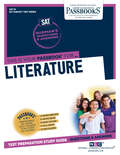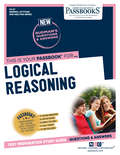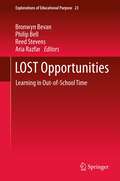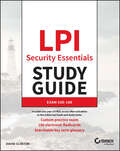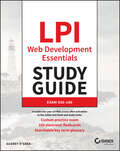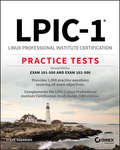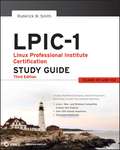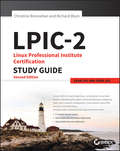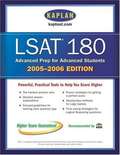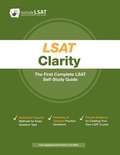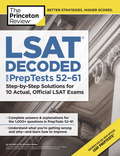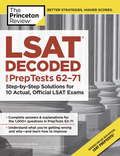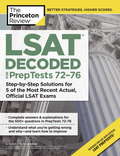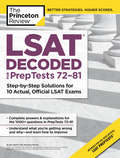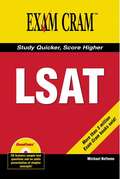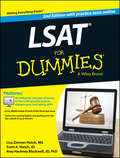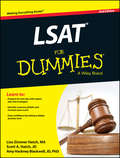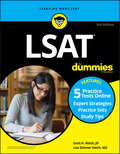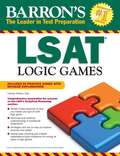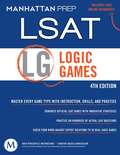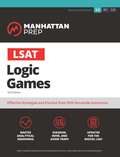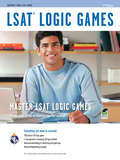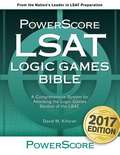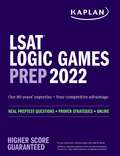- Table View
- List View
LITERATURE: Passbooks Study Guide (College Board SAT Subject Test Series #Upft-14)
by National Learning CorporationSAT Subject Tests, developed by the College Board, are required by many colleges and universities as part of their admission requirements. The SAT Literature Passbook® prepares you for your test by allowing you to take practice exams modeled after the real SAT Subject Test. It provides hundreds of reading comprehension questions and answers that require knowledge of basic literary terminology and understanding of literary concepts. The book is comprised of dozens of reading passages similar to the ones you will find on your upcoming exam, including but not limited to: prose passages (fictional works, essays, etc.), poetry, excerpts, American literature, English literature and Renaissance works.
LOGICAL REASONING: Passbooks Study Guide (General Aptitude and Abilities Series (CS) #Vol. Cs-47)
by National Learning CorporationThe General Aptitude and Abilities Series provides functional, intensive test practice and drill in the basic skills and areas common to many civil service, general aptitude or achievement examinations necessary for entrance into schools or occupations. The Logical Reasoning Passbook® prepares you by sharpening the skills and abilities necessary to succeed in different types of civil-service positions. It provides hundreds of multiple-choice questions that include, but are not limited to: understanding and interpreting written material; fundamentals of logic; and more.
LOST Opportunities
by Reed Stevens Philip Bell Aria Razfar Bronwyn BevanLearning in informal settings is attracting growing attention from policymakers and researchers, yet there remains, at the moment, a dearth of literature on the topic. Thus this volume, which examines how science and mathematics are experienced in everyday and out-of-school-time (OST) settings, makes an important contribution to the field of the learning sciences. Conducting research on OST learning requires us to broaden and deepen our conceptions of learning as well as to better identify the unique and common qualities of different learning settings. We must also find better ways to analyze the interplay between OST and school-based learning. In this volume, scholars develop theoretical structures that are useful not only for understanding learning processes, but also for helping to create and support new opportunities for learning, whether they are in or out of school, or bridging a range of settings. The chapters in this volume include studies of everyday and 'situated' processes that facilitate science and mathematics learning. They also feature new theoretical and empirical frameworks for studying learning pathways that span both in- and out-of-school time and settings. Contributors also examine structured OST programs in which everyday and situated modes of learning are leveraged in support of more disciplined practices and conceptions of science and mathematics. Fortifying much of this work is a leading focus on educational equity--a desire to foster more socially supportive and intellectually engaging science and mathematics learning opportunities for youth from historically non-dominant communities. Full of compelling examples and revealing analysis, this book is a vital addition to the literature on a subject with a fast-rising profile.
LOW RISK NEONATAL NURSING: Passbooks Study Guide (Certified Nurse Examination Series)
by National Learning CorporationThe Certified Nurse Examination Series prepares individuals for licensing and certification conducted by the American Nurses Credentialing Center (ANCC), the National Certification Corporation (NCC), the National League for Nursing (NLN), and other organizations. The Low Risk Neonatal Nursing Passbook® provides a series of informational texts as well as hundreds of questions and answers in the areas that will likely be covered on your upcoming exam.
LPI Security Essentials Study Guide: Exam 020-100
by David ClintonPrepare smarter and faster for the LPI Security Essentials exam In LPI Security Essentials Study Guide: Exam 020-100, veteran Linux server administrator David Clinton delivers an expert tutorial on the major security threats facing computers, networks, connected devices, and IT services, both on-premise and in the cloud. You’ll discover common and effective ways to prevent, mitigate, and respond to security attacks, and validate your ability to use encryption to secure data transferred through a network. This book is designed to prepare you for the LPI Security Essentials certification offered by the global standard and career support organization for open-source professionals. Whether you’re preparing for this foundational exam as a steppingstone to the more advanced Security+ certification or as an end in itself, you’ll advance your knowledge of security concepts, encryption, node, device, and storage security, network and service security, and identity and privacy concepts. You’ll get: Techniques and tools you can use immediately in a new role as an IT security professional Key strategies for digital self-defense, including securing your own devices and making use of IT services Complimentary access to Sybex’s superior online interactive learning environment and test bank, complete with chapter tests, a practice exam, electronic flashcards, and a glossary of key terms Perfect for anyone seeking to take the LPI Security Essentials certification exam, LPI Security Essentials Study Guide, Exam 020-100 is a must-have resource for people looking to hit the ground running in a new career focused on information security.
LPI Web Development Essentials Study Guide: Exam 030-100
by Audrey O'SheaPass the LPI Web Development Essentials exam and set yourself up for success at a new web development job In LPI Linux Professional Institute Web Development Essentials Study Guide: Exam 030-100, accomplished IT educator and systems engineer, Audrey O’Shea delivers an easy-to-follow and hands-on roadmap to passing the LPI Web Development Essentials exam and hitting the ground running at a new job as a web developer. In the book, you’ll explore the software development skills, web technologies, HTML, CSS, Node.js, and JavaScript info you need to implement modern applications and solutions in a web environment. You will find: Introductory coverage of SQL, HTML, JavaScript, CSS, and MongoDB A heavy emphasis on real-world job skills, as well as the technologies used every day by web developers in the field Complimentary access to the Sybex interactive online learning environment and test bank, complete with hundreds of practice questions, electronic flashcards, and a searchable glossary of important termsAn essential and practical resource for anyone preparing for the Web Development Essentials certification exam, LPI Linux Professional Institute Web Development Essentials Study Guide: Exam 030-100 is also the ideal book for entry-level software developers seeking knowledge of web development tools and principles.
LPIC-1 Linux Professional Institute Certification Practice Tests: Exam 101-500 and Exam 102-500
by Steve Suehring1,000 practice questions with answers and explanations, organized into 10 full-length tests, PLUS 2 practice exams; complements the LPIC-1 Study Guide Linux Servers currently have a 20% market share which continues to grow. The Linux OS market saw a 75% increase from last year and is the third leading OS, behind Windows and MacOS. There has never been a better time to expand your skills, broaden your knowledge, and earn certification from the Linux Professional Institute. LPIC-1: Linux Professional Institute Certification Practice Tests is the must-have complement to the bestselling LPIC-1 Study Guide. Practice tests help you gain confidence and identify the areas in need of more attention. Ten full-length tests, covering the ten objective domains, and two additional 60-question practice exams contain 1000 practice questions, complete with answers and full explanations! Divided into two parts, this volume of practice tests covers Exams 101-500 and 102-500. Part I covers system architecture, Linux installation and Package management, GNU and Unix Commands, and devices, and Linux filesystems and filesystem hierarchy. Part II focuses on shells and shell scripting, user interfaces and desktops, administrative tasks, essential system services, networking, and security. This book: Covers all objective domains of the LPIC-1 exam Provides additional practice questions to supplement the LPIC-1 Study Guide Helps reinforce vital skills and knowledge Includes one year of FREE access to the online test bank LPIC-1: Linux Professional Institute Certification Practice Tests is a must-have resource for network and system administrators studying for the LPIC-1 exams and Linux administrators or IT professionals looking to update their skillset.
LPIC-2 Linux Professional Institute Certification Study Guide
by Roderick W. SmithThe first book to cover the LPIC-2 certificationLinux allows developers to update source code freely, making it an excellent, low-cost, secure alternative to alternate, more expensive operating systems. It is for this reason that the demand for IT professionals to have an LPI certification is so strong. This study guide provides unparalleled coverage of the LPIC-2 objectives for exams 201 and 202. Clear and concise coverage examines all Linux administration topics while practical, real-world examples enhance your learning process. On the CD, you'll find the Sybex Test Engine, electronic flashcards, and a glossary containing the most important terms you need to understand..Prepares you for exams 201 and 202 of the Linux Professional Institute CertificationOffers clear, concise coverage on exam topics such as the Linux kernel, system startup, networking configuration, system maintenance, domain name server, file sharing, and moreAddresses additional key topics for the exams including network client management, e-mail services, system security, and troubleshootingThis must-have study guide serves as an invaluable roadmap to attaining LPI certification.
LPIC-2: Exam 201 and Exam 202
by Richard Blum Christine BresnahanFull coverage of the latest LPI-level 2 exams, with bonus online test bank LPIC-2 is the one-stop preparation resource for the Linux Professional Institute's Advanced Level certification exam. With 100 percent coverage of all exam objectives, this book provides clear and concise coverage of the Linux administration topics you'll need to know for exams 201 and 202. Practical examples highlight the real-world applications of important concepts, and together, the author team provides insights based on almost fifty years in the IT industry. This brand new second edition has been completely revamped to align with the latest versions of the exams, with authoritative coverage of the Linux kernel, system startup, advanced storage, network configuration, system maintenance, web services, security, troubleshooting, and more. You also get access to online learning tools including electronic flashcards, chapter tests, practice exams, and a glossary of critical terms to help you solidify your understanding of upper-level Linux administration topics. The LPI-level 2 certification confirms your advanced Linux skill set, and the demand for qualified professionals continues to grow. This book gives you the conceptual guidance and hands-on practice you need to pass the exam with flying colors. Understand all of the material for both LPIC-2 exams Gain insight into real-world applications Test your knowledge with chapter tests and practice exams Access online study aids for more thorough preparation Organizations are flocking to the open-source Linux as an excellent, low-cost, secure alternative to expensive operating systems like Microsoft Windows. As the Linux market share continues to climb, organizations are scrambling to find network and server administrators with expert Linux knowledge and highly practical skills. The LPI-level 2 certification makes you the professional they need, and LPIC-2 is your ideal guide to getting there.
LSAT 180
by Eric GoodmanThe challenging practice and proven strategies you need to get a perfect score on the LSAT. This advanced guide includes: the toughest questions, the most effective logic games tactics, powerful reading comprehension strategies, top scoring logical reasoning techniques
LSAT Clarity: The First Complete LSAT Self-study Guide
by Outside LsatThe Evolution of LSAT Prep Books LSAT Clarity is the latest step in the evolution of LSAT prep books. The first wave of LSAT prep books featured single-volume, simplistic guides from big name prep companies geared primarily at promoting the company s expensive prep courses. Then came multi-volume prep books that included targeted practice but lacked direction on working a full LSAT course. Finally, LSAT Clarity is a focused single-volume guide that includesevery key component you will need in order to achieve the most thorough and successful LSAT prep possible. LSAT Clarity discloses powerful methods and specific practice approaches that will allow you to achieve your maximum potential with less wasted time and a lower price tag. LSAT Clarity introduces powerful new features: detailed book schedules to fit your timeline, guidance on working the full course, a valuable supplemental prep packet in the mail, chapter outlines for review, unique skill based problem sets designed to start at your level and build to your maximum achievement. LSAT Clarity is the first complete LSAT self-study guide. With LSAT Clarity s competitive price and robust additional features, there s no reason why you should settle for less than the cutting edge. Gain the skills and understanding to maximize your LSAT score without spending hundreds on a course Book Features Learn effective and flexible methods for the Logical Reasoning, Reading Comprehension and Games sections. Practice with hundreds of questions and our exclusive problem sets. The valuable Supplemental Packet you receive in the mail includes LSAT Simulations, a Prep Journal, a Test Day checklist and more Design a full self-study course with extensive prep theory and sample schedules tailored to your timeline, skill sets, and desired outcome.
LSAT Decoded (PrepTests 52-61): Step-by-Step Solutions for 10 Actual, Official LSAT Exams
by Princeton ReviewThis eBook edition is optimized for on-screen viewing with cross-linked questions, answers, and explanations.DECODE THE QUESTIONS. DEFEAT THE LSAT.All the practice in the world won't help you improve if you can't understand what you're doing wrong. That's why The Princeton Review's new LSAT Decoded series is the perfect companion for LSAC's Official LSAT PrepTest® books. LSAC provides the real exams but no accompanying answer explanations; we skip the question stems but provide valuable, step-by-step solutions for every one of the 1000+ questions on those tests. Armed with explanations, you can start to understand why you got an LSAT question wrong--and feel confident about when you're getting them right. By working through each question methodically, you'll:* learn how the test-writers think, and how to outthink them;* start to pinpoint the argument types that consistently trip you up, and learn the best ways to handle them; * train yourself to swiftly and effectively build diagrams for tricky Logic Games. With the test-conquering tips and strategies found in LSAT Decoded's explanations, you'll finally be able to decipher the secret language of this notoriously difficult exam.This book is intended to be used as a companion to the LSAC-issued 10 New Actual, Official LSAT PrepTests with Comparative ReadingTM (PrepTests 52-61), which contains real tests administered from September 2007 to October 2010. The full text of the PrepTests is not included in this book.
LSAT Decoded (PrepTests 62-71): Step-by-Step Solutions for 10 Actual, Official LSAT Exams
by Princeton ReviewThis eBook edition is optimized for on-screen viewing with cross-linked questions, answers, and explanations.DECODE THE QUESTIONS. DEFEAT THE LSAT.All the practice in the world won't help you improve if you can't understand what you're doing wrong. That's why The Princeton Review's new LSAT Decoded series is the perfect companion for LSAC's Official LSAT PrepTest® books. LSAC provides the real exams but no accompanying answer explanations; we skip the question stems but provide valuable, step-by-step solutions for every one of the 1000+ questions on those tests. Armed with explanations, you can start to understand why you got an LSAT question wrong--and feel confident about when you're getting them right. By working through each question methodically, you'll:* learn how the test-writers think, and how to outthink them;* start to pinpoint the argument types that consistently trip you up, and learn the best ways to handle them; * train yourself to swiftly and effectively build diagrams for tricky Logic Games. With the test-conquering tips and strategies found in LSAT Decoded's explanations, you'll finally be able to decipher the secret language of this notoriously difficult exam.This book is intended to be used as a companion to the LSAC-issued 10 Actual, Official LSAT PrepTests Volume VTM: PrepTests 62-71, which contains real tests administered from December 2010 to December 2013. The full text of the PrepTests is not included in this book.
LSAT Decoded (PrepTests 72-76): Step-by-Step Solutions for 5 of the Most Recent Actual, Official LSAT Exams
by Princeton ReviewThis eBook edition is optimized for on-screen viewing with cross-linked questions, answers, and explanations.DECODE THE QUESTIONS. DEFEAT THE LSAT.All the practice in the world won't help you improve if you can't understand what you're doing wrong. That's why The Princeton Review's new LSAT Decoded series is the perfect companion for LSAC's Official LSAT PrepTest® books. LSAC provides the real exams but no accompanying answer explanations; we skip the question stems but provide valuable, step-by-step solutions for every one of the 500+ questions on those tests. Armed with explanations, you can start to understand why you got an LSAT question wrong--and feel confident about when you're getting them right. By working through each question methodically, you'll:* learn how the test-writers think, and how to outthink them;* start to pinpoint the argument types that consistently trip you up, and learn the best ways to handle them; * train yourself to build diagrams swiftly and effectively for tricky Logic Games.With the test-conquering tips and strategies found in LSAT Decoded's explanations, you'll finally be able to decipher the secret language of this notoriously difficult exam.This book is intended to be used as a companion to the individual Official LSAT PrepTests numbered 72, 73, 74, 75, and 76, which are real tests administered from June 2014 to October 2015. The full text of the PrepTests is not included in this book.
LSAT Decoded: Step-by-Step Solutions for 10 Actual, Official LSAT Exams (Graduate School Test Preparation)
by Princeton ReviewDECODE THE QUESTIONS. DEFEAT THE LSAT.The Princeton Review’s LSAT Decoded series is the perfect companion for LSAC’s Official LSAT PrepTest® books. LSAC provides the real exams but no accompanying answer explanations; we skip the question stems but provide valuable, step-by-step solutions for every one of the 1000+ questions on those tests. Armed with explanations, you can start to understand why you got an LSAT question wrong—and feel confident about when you’re getting them right. By working through each question methodically, you’ll:• learn how the test-writers think, and how to outthink them;• start to pinpoint the argument types that consistently trip you up, and learn the best ways to handle them; • train yourself to swiftly and effectively build diagrams for tricky Logic Games. With the test-conquering tips and strategies found in LSAT Decoded’s explanations, you'll finally be able to decipher the secret language of this notoriously difficult exam.This book is intended to be used as a companion to the LSAC-issued 10 Actual, Official LSAT PrepTests Volume VI™: PrepTests 72–81, which contains real tests administered from June 2014 to June 2017. The full text of the PrepTests and individual PrepTest questions are not included in this book.
LSAT For Dummies
by Amy Hackney Blackwell Scott Hatch Zimmer HatchA detailed study guide that guarantees a high LSAT scoreIf you thought you left standardized tests back in high school, think again. LSAT For Dummies, 2rd Edition is an all-inclusive study guide arming you with tips and know-how for your next career move. This updated edition includes three full-length practice tests, a review of foundational concepts for every section, thorough explanations, and additional practice problems for all question types. Whether you're taking the LSAT for the first time or the third time, this book will provide the guidance and skill set you need to obtain a score that reflects your abilities. Instead of facing the process alone, turn to the trusted For Dummies brand for proven test-taking strategies and ample practice opportunities.Ideal for those who want to break into this increasingly competitive field, in which a high score on the LSAT lends prospective lawyers an undeniable advantageExamines every topic and common pitfalls covered in the test, which consists of five 35-minutes sections of multiple-choice questions and a 35-minute writing sampleFor aspiring law school students, LSAT For Dummies is the most advantageous guide to increasing your score on a test that can make or break your legal aspirations.
LSAT For Dummies
by Amy Hackney Blackwell Scott A. Hatch Lisa Zimmer HatchA detailed study guide that guarantees a high LSAT score If you thought you left standardized tests back in high school, think again. LSAT For Dummies, 2rd Edition is an all-inclusive study guide arming you with tips and know-how for your next career move. This updated edition includes three full-length practice tests, a review of foundational concepts for every section, thorough explanations, and additional practice problems for all question types. Whether you're taking the LSAT for the first time or the third time, this book will provide the guidance and skill set you need to obtain a score that reflects your abilities. Instead of facing the process alone, turn to the trusted For Dummies brand for proven test-taking strategies and ample practice opportunities. Ideal for those who want to break into this increasingly competitive field, in which a high score on the LSAT lends prospective lawyers an undeniable advantage Examines every topic and common pitfalls covered in the test, which consists of five 35-minutes sections of multiple-choice questions and a 35-minute writing sample For aspiring law school students, LSAT For Dummies is the most advantageous guide to increasing your score on a test that can make or break your legal aspirations.
LSAT For Dummies: Book + 5 Practice Tests Online
by Scott A. Hatch Lisa Zimmer HatchLSAT For Dummies prepares readers for the exam by giving them proven test-taking strategies, detailed content review, and plenty of practice questions. Features of this edition include: * 3 full-length practice tests -- two in the book plus a bonus exam online * Review of foundational concepts for every section * Complete explanations and additional practice questions for all question types * 1-year access to an online test bank for self-directed practice
LSAT Logic Games
by Carolyn NelsonProspective law students must pass the LSAT to gain acceptance into law school, and the LSAT's Analytical Reasoning section--commonly called the Logic Games section--is widely considered to be the most difficult part of the entire exam. In this 35-minute session, test takers are presented with four problems, or Logic Games, which include a total of 22 to 24 very challenging questions that test their deductive reasoning ability. In very simple, straightforward language, this brand-new manual offers students detailed, step-by-step dissections of every question type. Also included are: A comprehensive five-step approach to help students make accurate deductions and successfully tackle the questions An overview of the LSAT, including helpful advice on effective LSAT time management Drill exercises for reinforcing the understanding of conditional statements The author, Carolyn Nelson, founder of Nelson Test Prep, has been teaching LSAT prep for 20 years. Employing the methods outlined in this book, she's been able to demystify Logic Games for thousands of students. She also offers extensive study and test-taking advice, and presents 50 practice games with answers and detailed explanations, each inspired by games that have appeared on recent LSATs. For students who have experienced LSAT anxiety, Carolyn Nelson's innovative approach to dissecting any Logic Game will help them gain calm and clarity and avoid pitfalls of craftily structured Games. Here, in a single volume, is everything test takers need for success on the LSAT's Analytical Reasoning section.
LSAT Logic Games
by Manhattan PrepThe Manhattan Prep Logic Games LSAT Strategy Guide is truly cutting-edge. Containing the best of Manhattan Prep's proven strategies, this book will teach you how to tackle the LSAT games efficiently and flexibly.Beginning with how to recognize each and every game type, the Logic Games LSAT Strategy Guide takes you through the entire solving process. You will learn strategies for making inferences, techniques for accurate diagramming, and tools for improving your time management. Each chapter is designed to encourage mastery with timed drill sets that use real LSAT logic game questions and provide in-depth explanations, including hand-drawn diagrams and notes from Manhattan Prep's expert instructors. The books wraps with coached practice sets and with complete solutions to all the logic games in PrepTests 40-60. Additional resources are included online and can be accessed through the Manhattan Prep website.Used by itself or with other Manhattan Prep materials, the Logic Games LSAT Strategy Guide will push you to your top score.
LSAT Logic Games (Manhattan Prep LSAT Strategy Guides)
by Manhattan PrepManhattan Prep&’s LSAT Logic Games guide, fully updated for the digital exam, is an essential tool for the LSAT section that everyone loves to hate. Manhattan Prep&’s LSAT guides use officially-released LSAT questions and are written by the company&’s instructors, who have all scored a 172 or higher on the official LSAT—we know how to earn a great score and we know how to teach you to do the same.This guide will train you to approach LSAT logic games as a 99th-percentile test-taker does:Recognize every type of gameMake valid inferencesDiagram quickly and accuratelyPredict correct answers and spot trap answersTake advantage of the digital format to work quickly and strategicallyYou will have access to many practice problems and extensive solutions:Timed drill sets made up of real LSAT questions to help you absorb and apply what you&’ve learnedIn-depth solutions, including hand-drawn diagrams and step-by-step analysisAccess to complete solutions for all of the logic games in PrepTests 40–70
LSAT Logic Games 2nd Ed. (Lsat Test Preparation Ser.)
by Robert WebkingREA's LSAT Logic Games Test Prep Gets You Ready for the LSAT! Updated Second Edition Written by Dr. Robert Webking, co-founder of the University of Texas at El Paso Law School Preparation Institute, our LSAT Logic Games test prep shows law school candidates like you how to master the Analytical Reasoning section of the exam and score higher on the LSAT. One hundred practice LSAT logic games cover every type of logic problem that may appear on the actual LSAT. Detailed answer explanations to each game show you how to analyze the game, helping you to identify areas of strengths and weaknesses before test day. The author analyzes what many students find most challenging about the Analytical Reasoning questions - the language. Our test prep shows you how to read and interpret the often-confusing questions, so you can quickly determine what's being asked and answer correctly. LSAT Logic Games teaches you comprehensive deduction methodologies as the means to identify and approach each game type. Advanced diagram strategies and rules for each game type guide you through solving problems, so you'll be prepared for the LSAT. The book is packed with LSAT test-taking tips and advice that help avoid time-wasting errors. Our detailed Question and Answer Analysis provides even greater insight into each logic game. Get the competitive edge with the test prep authored by one of the nation's top LSAT experts!
LSAT Logic Games Bible: A Comprehensive System For Attacking the Logic Games Section of the LSAT
by David M. KilloranThe PowerScore LSAT Logic Games BibleTM is the most comprehensive book available for the Logic Games section of the LSAT. This best-selling book will provide you with an advanced system for attacking any game that you may encounter on the LSAT. The concepts presented in the Logic Games Bible are representative of the techniques covered in PowerScore's live courses and have consistently been proven effective for thousands of students. The PowerScore Logic Games Bible features and explains a detailed methodology for solving all aspects of Logic Games, including: Recognizing game types and the proper way to represent rules The methods for making inferences efficiently and accurately Techniques for solving each question type Detailed explanations for 30 official LSAT logic games Time management strategies Extensive drills to reinforce every major concept A classification of every type of game that has appeared on the LSAT since June 1991 Access to a unique website that provides additional materials to complement the book and answer frequently asked student questions. The Analytical Reasoning problems on the LSAT are often the most intimidating; however, once you understand how to construct an appropriate setup and make the necessary inferences, the solution to each question is quickly discovered. The following Game types are covered in detail: Basic Linear Games Advanced Linear Games Grouping Games Grouping and Linear Combination Games Mapping Games Pattern Games Sequencing Games Circular Sequencing Games Numerical Distribution Games Limited Possibilities Games
LSAT Logic Games Prep 2022 (Kaplan Test Prep)
by Kaplan Test PrepIn LSAT Logic Games Prep 2022–2023, Kaplan's unique instruction combines real LSAT PrepTest questions with exercises and drills to help you understand every type of Logic Game through the eyes of the testmaker. This book is up-to-date with the Digital LSAT, and it is designed especially for the self-prep student — compatible with the testmaker&’s digital practice tool and well-known free prep resources. Most students view Logic Games as the toughest section of the LSAT. Our guide features exclusive data on test taker performance and recent LSAT trends to help you avoid surprises on test day. You&’ll get complete explanations, focused strategies, and targeted review to help you master the Logic Games section of the LSAT. We are so certain that LSAT Logic Games Prep offers all the knowledge you need to excel on the LSAT that we guarantee it: after studying with the online resources and book, you'll score higher on the LSAT—or you'll get your money back.Essential Strategies and PracticeLogic Games strategies will help you tackle the toughest games with the most advanced twists or if you just need more help with the basics to get started.Kaplan&’s LSAT experts share practical tips for using LSAC&’s popular digital practice tool and the most widely used free online resources.Official LSAT PrepTest practice questions let you get comfortable with the test format.Study plans will help you make the most of your practice time, regardless of how much time that is. Our exclusive data-driven learning strategies help you focus on what you need to study.Diagnostic tools analyze individual strengths and weaknesses by game type, so you can personalize your prep.LSAT Training Camp features hundreds of quick, skills-based practice drills so you can refine your approach to the Logic Games section.Interactive online instructor-led workshops give expert review.A comprehensive course preview features online test analytics that analyze your performance by section and question type.Expert GuidanceLSAT Logic Games Prep comes with access to an episode from Kaplan's award-winning LSAT Channel, which features one of Kaplan's top LSAT teachers.We know the test: Kaplan's expert LSAT faculty teach the world's most popular LSAT course, and more people get into law school with a Kaplan LSAT course than with all other major test prep companies combined.Kaplan's experts ensure our practice questions and study materials are true to the test.We invented test prep—Kaplan (www.kaptest.com) has been helping students for 80 years. Our proven strategies have helped legions of students achieve their dreams.
